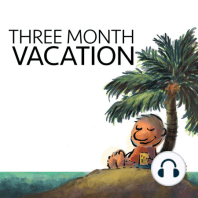21 min listen

What I Learned in 2016—And How It Made Me Calmer As A Result
What I Learned in 2016—And How It Made Me Calmer As A Result
ratings:
Length:
34 minutes
Released:
Feb 18, 2017
Format:
Podcast episode
Description
Everyone loves a fabulous year, but the best years for us are those that aren't terribly great. We learn more, and go through a revolution in such "difficult" years. That was 2016 for me. Life took me on diversions I hadn't expected and to me that became the most interesting element of all. Now I look forward to the diversion. Find out how you can be calm even when life takes you off route. And how the off route can be the one thing you look forward to time and time again. In this episode Sean talks about Part 1: Why Goals Are Not Enough (And Why Pacing Matters) Part 2: Time Management vs. Energy Management Part 3: Dealing With Seemingly Closed Doors To read it online: https://www.psychotactics.com/power-diversion/ ----------------------- In February 2016, I took a rather interesting vow. I vowed to stop grumbling. Now let's get one thing straight: we all grumble. Some do more than others, but I'm one of those people who are easily disappointed, and so I'm relatively more prone to grumbling. Why I decided to stop grumbling, I'm not sure, but I know it led me down an interesting path. Instead of spending all my time trying to figure out what was wrong with the situation, it often led me to analyse why I was in that situation in the first place. And that leads me right into what I learned in 2016. I learned why goals are not enough (and why pacing matters). I've always been clued into the fact that time management is not as powerful as energy management. And 2016 was when I had some solid, practical applications for this concept of time vs. energy. I also realised that closed doors open, if you're willing to persist. However, at the top of the list of my learning was “the importance of the diversion”. This message resonated stronger within me than anything else. Let's find out how and why the diversion mattered. In July 2016, we decided to go to Goa, India. India, as amazing as it is in terms of beauty, food and culture is not quite a vacation for me. My parents live in Goa, which by itself used to calm and peaceful, but now seems like any other part of India, noisy and chaotic. What makes the visit slightly worse is the location of my parent's house My parents live in a tiny two-bedroom cottage, but it's located at a junction. If you've visited India, you know that horns on vehicles are meant to be used whenever possible. Cars, buses, motorcycles—they all honk while on the move, but almost always honk when at a junction, just to warn others of their approach. You see the problem, don't you? My parents are used to the traffic, as well as the honking, but the sounds of India drive me a little crazy. To make sure we were suitably removed from that chaos, we decided to rent our own cottage This cottage was about 15 kilometres (about 7 miles) from my parent's place and supposedly a lot quieter. You know how you're not supposed to trust things you see on the Internet, right? Well, we didn't. I got a cousin of mine to check out the place and get back to me. “It's by a narrow road,” she said, “and not particularly noisy. There's a bit of traffic, but it's not too bad.” Going by this assessment, we decided to rent the cottage. When got to Goa and the cottage was amazing It had a superb lounge area, superb art on the wall, decent food nearby, two large bedrooms and was perfect in every way but one: the sound of traffic. Apparently the road was narrow and seemingly devoid of traffic, but it also happened to be the route to an industrial estate. This meant that when traffic rolled, it was the sound of enormous trucks rolling by. Normally this would be enough reason to grumble We'd done all our due diligence and there we were in a situation not a lot better than before. Yet this location proved to the starting point of a completely different type of vacation. Normally on vacations we eat, drink and rest a lot. Instead we ended up at an Ayurvedic centre (quite by chance) and were instructed to stay on a diet, with no alcohol and we could o
Released:
Feb 18, 2017
Format:
Podcast episode
Titles in the series (100)
Why We Sell Less: The Root of Confidence: The hardest thing in business?or life is the factor of confidence. Whether you're in online marketing, selling products or services, or run a physical store, the confidence goes up and down. And yet, confidence is what creates sales. Sales, after all,... by The Three Month Vacation Podcast